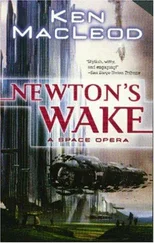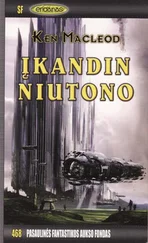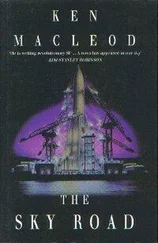Grant shook his head. “You still get far more future humans than present humans, even if we stay with same population for say the ten million years it would take to fill the galaxy. And thus, the same desperate improbability of our existence among the first, unless we’re also among the last.” He looked around, shoulders hunched. “Doom lurks unseen.”
“That’s even more stupid than the last one!” I said. “ Somebody has to be among the first. It’s just a brute fact.”
Grant leaned back, patted his belly, and smiled. “Exactly.”
If he’d made a point I didn’t see it.
“I mean, somebody could have made that argument when they were in the caves.”
“It was made before the caves, actually,” said Grant. “But don’t you see? Your argument is of the same type.”
“No, it is not,” I said. “That argument starts with a completely arbitrary notion, the ‘probability of being born,’ which is probably meaningless in the first place, and tries to deduce without any additional facts …”
At that point I ran out of road. I could see where I was going. “All right,” I said, with ill grace. “Point taken. So how do you explain it?”
A serving machine beeped. Grant took the coffee pot from its top and refilled our cups. He finger-tipped the machine and it wheeled on.
“Maybe it doesn’t have an explanation,” he said. “It doesn’t have to. We can in principle explain how life arose and developed and so on on both planets of origin. What else do we need to do? Do we need a separate explanation of why it arose on two so close together? Why? It’s just a brute fact. It happened. Things do. Events.”
“It’s still a big coincidence.”
“Yes,” he said. He gazed at me with a serious expression, unlike his habitual flippancy. “It’s a big coincidence . It’s something we can’t explain . But as far as we know that’s all it is. And if it isn’t, we’ll only find out by discovering more facts, not speculating, no matter how logical that speculation might seem. The way to learn the world is to look at the world .”
I could hear some criticism there, some tone of disappointment and reproof. And (sorry, Grant, if you’re reading this) I did not take it well, and I had no intention of letting him take it further. So I resorted to saying: “You’re a bit intense this morning, Grant Cornforth.”
“Yes,” he said. He sipped his coffee. “Sorry.”
I took this undeserved apology with a gracious wave of the hand. “That’s all right. Well, I have work to get on with. Same time tomorrow?”
“Of course,” he said. As I stood up he added: “Nice dress, by the way.”
I looked down at the rippling emerald satin shift. “Thank you,” I said, stepping away.
“Good choice,” he called after me.
“Yes, but the choice wasn’t mine,” honesty made me admit, over my shoulder. “My caremother sent it to me.”
Kwarive on the telephone: “There’s something you might like to see.”
“I’ll be over,” said Darvin, and put the receiver down. He knew from her tone that nothing more effusive was expected, and that something important was up. They had agreed on how to convey such matters. Getting clearance to tell Kwarive a fraction of the truth had required a fight with the Sight of which he could tell her nothing. His security handler had been rather too enamoured of his own clever idea for a cover story, which was that Darvin should tell Kwarive that he and Orro had male-bonded. Darvin had sometimes speculated that Orro was a male-bonding male — in parts of the Gevorkian armed and civil services and nobility it was almost a requirement — but he had no wish whatsoever to violate his friend’s privacy and reticence. He had made this point with such vehemence that the handler had asked him, not in jest, if the suggested cover story was in fact true. Darvin assured him it was not. The tale was in fact tempting — it would have reassured Kwarive that Darvin and Orro were not using their frequent mysterious absences for any dangerous or unsavoury purpose — but it would have been, Darvin knew, intolerable to Orro. So, with great reluctance and much scratching of floors and stamping of papers, the handler had agreed that Kwarive, as Darvin’s girlfriend and prospective roost-partner, could not be kept out of the circle. He was still enjoined to tell her nothing of the aeronautics, telecommunications, and other projects that the discovery of the alien visitation had stimulated; and he had sworn to that effect.
The Life Sciences Building smelt of flitter and skitter droppings, of preserving fluids and warm hay. Skulls and skins decorated its corridor walls, as in the roost of a plains hunter. Kwarive, as a student, didn’t have an office, but she had a regular place of work, the laboratory annex of the department’s museum. Her part-time job there gave her valuable training in practical skills as well as a small wage.
Darvin hurried past the dusty glass cases and stoppered glass jars and into the room at the far end. Shelves lined its walls, laden with preserved animal parts, bones, chunks of mineral, and stacks of paper. Its door faced the window, and between door and window lay a long table that, except for the electrical lamps and dissection microscope, looked a lot like a prey-merchant’s counter. Bloodstains, gashes, sharp tools, animal parts. Kwarive looked up from the far end. She gestured to a shelf near the door.
“Pick up the telephone receiver,” she said. “Hold it to your ear.”
Puzzled, Darvin complied. He heard nothing but the expected whining whir. Kwarive, holding a closed basket, paced down the room towards him. As she approached, the telephone’s note changed, overlaid by a faint buzz that rose in volume with every step she took. When she held the basket beside the receiver, the buzz dominated the sound of the empty line. Kwarive smiled at him and retraced her steps. The buzz diminished.
Darvin returned the receiver to its cradle.
“What have you got in there?” he asked.
“Guess,” said Kwarive.
“Some electrical device?”
“Come and have a look.”
His hand on the basket lid, he hesitated. “No trick?” he asked.
Kwarive looked indignant. “Nothing’s going to jump out at you.”
On the floor of the basket was a shittle. A common grazer-dung-eating insect about the length of a thumb, it was in no way different from any other shittle Darvin had ever seen: stubby feelers, sturdy nippers, two camera eyes, four legs on the thorax, four on the metathorax, shiny blue wing-cases along the abdomen.
Darvin closed the lid and raised his brows. “Yes?”
“You asked me to tell you about anything unusual,” Kwarive said.
“Well, it’s certainly an interesting discovery,” Darvin said. “I bet nobody knew shittles have an electrical field. Maybe they use it to find their way around in the shit, like electric fish do in murky water, or perhaps it’s a defence—”
“Shittles don’t have an electrical field,” said Kwarive.
“How do you know?”
Kwarive jumped on to the perch at the end of the table and huffed. When her wings had settled she pointed to another identical basket on a shelf.
“There’s a whole basket of them there,” she said. “See for yourself.” Darvin checked that the basket indeed contained a crawling mass of the ugly brutes, and carried it to the telephone. He picked up the receiver and heard only the whir. He returned and put the basket back.
“Maybe it’s a different species.”
Kwarive chittered her teeth at him. “I’m the biologist here.”
“All right,” said Darvin, abashed. “Sorry. So tell me how you found this one.”
Читать дальше












